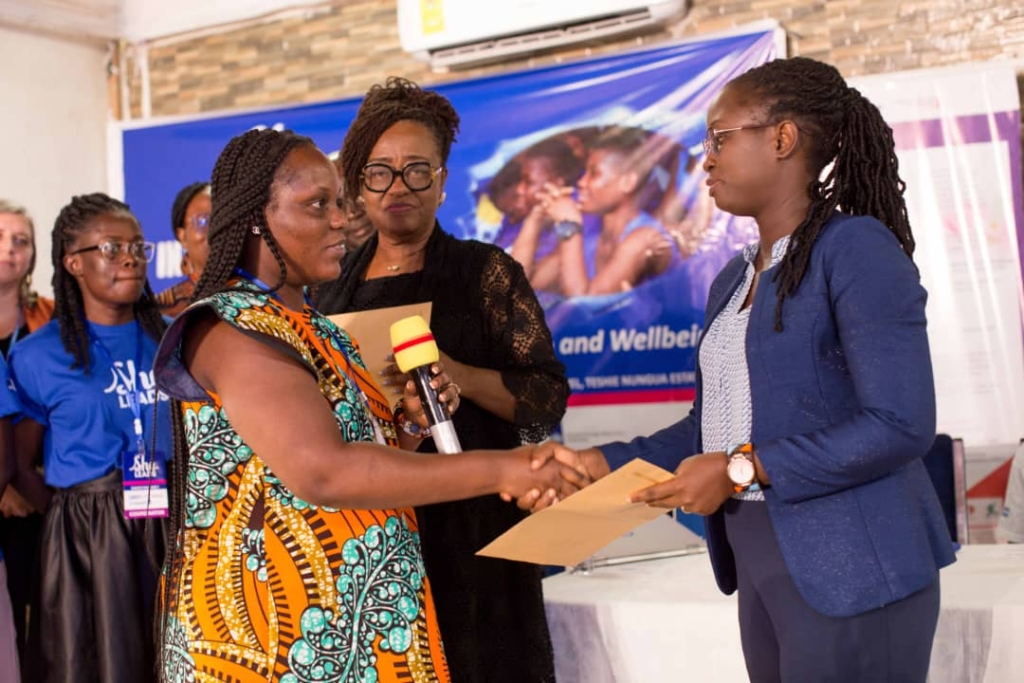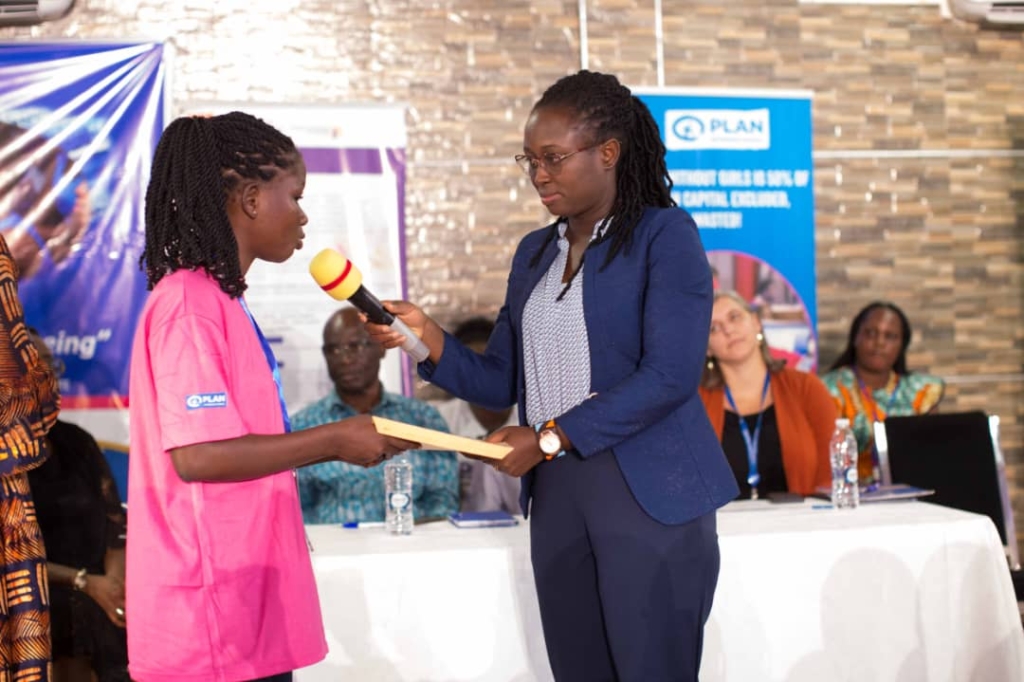She leads Ghana consortium has presented two communique to parliament on the passage of Affirmative Action (Gender Equality) Bill and to make sanitary pads accessible and affordable for all.
She Leads Ghana is made up Plan International Ghana, Defence for children International and the Africa Women's Development and Communication Network together with UNICEF, Affirmative Action Bill Coalition and WiLDAF, in solidarity with girls and young women wand implementing partners: Community Aid for Rural Development (CARD Ghana), Women Aspire Network, Songtaba, Defense for Children, Erudite Women Empowerment Foundation, Rights and Responsibilities Initiatives Ghana.
The communiques read;
1. A Communique on The Passage Of The Affirmative Action Bill Into Law Issued By Girls And Young Women Of She Leads Ghana On October 11th, 2023 To Parliament Through The MoGCSP.
“We, the She Leads Girls and Young women in collaboration with Defence for Children International Ghana, Plan International Ghana, and the Africa Women's Development and Communication Network, and with support from the Dutch Ministry of Foreign Affairs, recognize that achieving the sustainable development goals by 2030 will depend on women's equal participation and leadership in political and professional life. Having both men and women involved in decision-making broadens the perspectives, increases creativity and innovation, diversifies the pool of talents and competences, reduces conflicts, and improves the process of decision-making. However, data shows that women are underrepresented across all levels of decision-making worldwide.
In Ghana, though women constitute more than half of the country’s population, women’s representation in parliament stands at 14.5% which is below the United Nations threshold of 30%. Representation of women at the district assembly level has also seen a decline over the years from 10% in 2006 to 5%. The situation is no different in government's ministerial, ambassadorial and board appointments.
These statistics are influenced by a number of factors, including socially prescribed roles and characteristics that are typically subordinate, rooted in patriarchy, and typically based on the idea that women and girls should be submissive, not aim too high, and stay within the parameters set for them. These ideas are then supported by tradition and practice, such as forced or child marriages and a lack of education that prevents women and girls from aspiring to positions of leadership. Women's vulnerability to poverty and lack of money to fund their campaigns are made worse by gender inequality in access to and control over social services and productive resources. Due to patriarchy and the perception that female politicians are unlikely to win, political parties and financiers are apprehensive of supporting them. Even though Ghana has endorsed and ratified a number of laws at the international and regional levels to promote equal representation of women and men, if necessary, through positive action, the need for the equal voice and representation would not happen without legal intervention.
The Affirmative Action bill, which calls for at least 40% of public offices to be reserved for women in order to improve women's participation in decision-making positions, has been in the parliament for more than a decade but has not attracted the necessary attention for it to become law. If the approach has proven successful in several African nations, including Rwanda, Ethiopia, South Africa, Guinea, Kenya, and Senegal, to name a few, why won't the government of Ghana pass the Affirmative Action Law right away to address women's underrepresentation in political, social, and economic spheres?
Today, we, She Leads Girls and Young Women representatives, wants to add our voice to civil society organizations such as ABANTU for Development, Network for Women’s Rights in Ghana, ActionAid, Women in Law and Development (WiLDAF), Federation of Women Lawyers (FIDA), Affirmative Action Coalition, and several others who have been at the forefront of advocacy campaigns, canvassing for support for the passage of the Bill and demand the speedy passage of the bill into law by parliament.
We believe that the Affirmative Action Bill, when passed into Law, will promote democracy, inclusion and good governance at all levels of governance and decision-making in Ghana, as well as address other social and economic imbalances. We understand that the Bill will require the government to ensure equitable gender representation at all levels. It will apply to the public service, ministerial positions, independent constitutional bodies, boards of state institutions, security services and political parties.
In conclusion, we think that reaching the goal of gender equality in decision-making will create a balance that better reflects the make-up of society and is necessary to improve democracy and encourage its proper functioning. Thank you.” Cc: Affirmative Action Bill Coalition

2. Communique Issued by Girls With Disability On Government Making Sanitary Pads Accessible And Affordable For All On October 11th 2023.
PREAMBLE: “We, Girls with Disability first issued a communique on the 3rd of December 2022 to commemorate the International Day of Persons with Disability with the theme: Zero Tax on Sanitary Pad for Inclusive Development. It has been a year now, but nothing has changed; the prices of sanitary products are still very high and girls like me are not able to go through our monthly natural processes in a dignified manner.
We have been paying close attention to the discussion between advocates like us and the industry about the affordability of sanitary products in Ghana. From what we have learned, the Ghanaian government classifies sanitary pads as miscellaneous manufactured goods that are subject to a number of taxes, including a 20 percent import duty, a 15 percent import VAT, and other import levies.
On one hand, advocates are asking for the scraping of these taxes on sanitary products because they are basic necessities and taxing them makes them too expensive and many girls are unable to afford them. On the other hand, industry players (Association of Ghana Industries) have raised concerns regarding the potential impact of scrapping taxes on imported sanitary pads.
While these discussions are ongoing, it is important to keep in mind that menstruation poverty is a serious problem in Ghana that poses serious obstacles to the development and well-being of women and girls all over the nation. Lack of access to inexpensive menstrual hygiene products, suitable facilities, and thorough menstrual health education keeps women and girls, particularly girls and women with disabilities, in poverty and at a disadvantage. This reality is considerably more perilous in Ghana's rural villages. The high cost of sanitary products is forcing girls to resort to unhygienic alternatives and pushing girls to “exchange sex for pads’ thereby putting their health and future at risk.
Though it is important for stake holders to continue to have these conversations to reach a consensus, the truth is that the cost of most sanitary pads is higher compared to the minimum living wage of GHS 14.88 in Ghana. So, I ask, how then can the vulnerable girl and young women like us afford a sanitary pad without struggling.
In commemorating the International Day of the Girl Child under the theme: Invest in Girls' Rights: Our Leadership & Wellbeing” do not forget the rights of girls to a hygienic menstrual management,”. Accordingly.
1. We call on the government, through the Ministry of Gender, Children, and Social Protection, as a matter of urgency to provide girls and young women, especially those with disabilities, with equal and affordable access to menstrual hygiene products. The government should consider including free sanitary pads in the free Senior High School policy.
2. We also want to call on private industries, sanitary pad production factories in Ghana to donate a percentage of every purchase made on their products towards supporting girls and young women living with disability who are going through many challenges.
3. Additionally, we call on all Civil society organizations and individuals to continue to donate towards persons with disabilities to relief them of some of the challenges they face. When they are distributing pads and other items to schools and communities, persons with disability should be prioritized on their list.
4. We call on Parliament to speed-up the debate regarding sanitary products and come up with a Law that will facilitate easy access and affordable sanitary products for inclusive development.”

The She Leads Project is a 5 year (2021-2025) strategic partnership between Terre des Hommes, Plan International, Defense for Children/ECPAT, African Women’s Development and Communication Network (FEMNET) and the Ministry of Foreign Affairs of the Netherlands.
Latest Stories
-
Woman dies after being set on fire on NYC subway
2 hours -
Elon Musk’s curious fixation with Britain
2 hours -
EBID wins the Africa Sustainability Award
3 hours -
Expansion Drive: Takoradi Technical University increases faculties
8 hours -
SHS heads demand payment of outstanding funds before reopening of schools
8 hours -
We thank God for the 2024 general elections – Akufo-Addo
9 hours -
Coconut Grove Beach Resort marks 30 years of excellence with memorable 9 lessons & carols service
9 hours -
WAFU B U-17 Girls’ Cup: Black Maidens beat Nigeria on penalties to win inaugral tournament
10 hours -
Real Madrid beat Sevilla to keep pressure on leaders Atletico
11 hours -
Liverpool put six past Spurs to go four points clear
11 hours -
Manchester United lose 3-0 at home to Bournemouth yet again
11 hours -
CHAN 2024Q: ‘It’s still an open game’ – Didi on Ghana’s draw with Nigeria
11 hours -
CHAN 2024Q: Ghana’s Black Galaxies held by Nigeria in first-leg tie
12 hours -
Dr Nduom hopeful defunct GN bank will be restored under Mahama administration
12 hours -
Bridget Bonnie celebrates NDC Victory, champions hope for women and youth
12 hours

